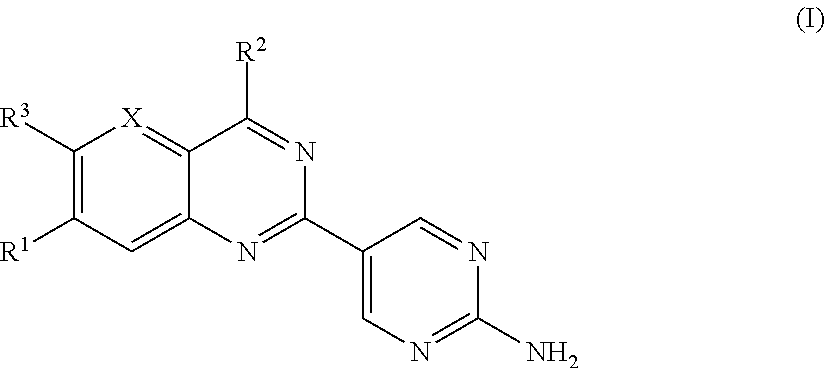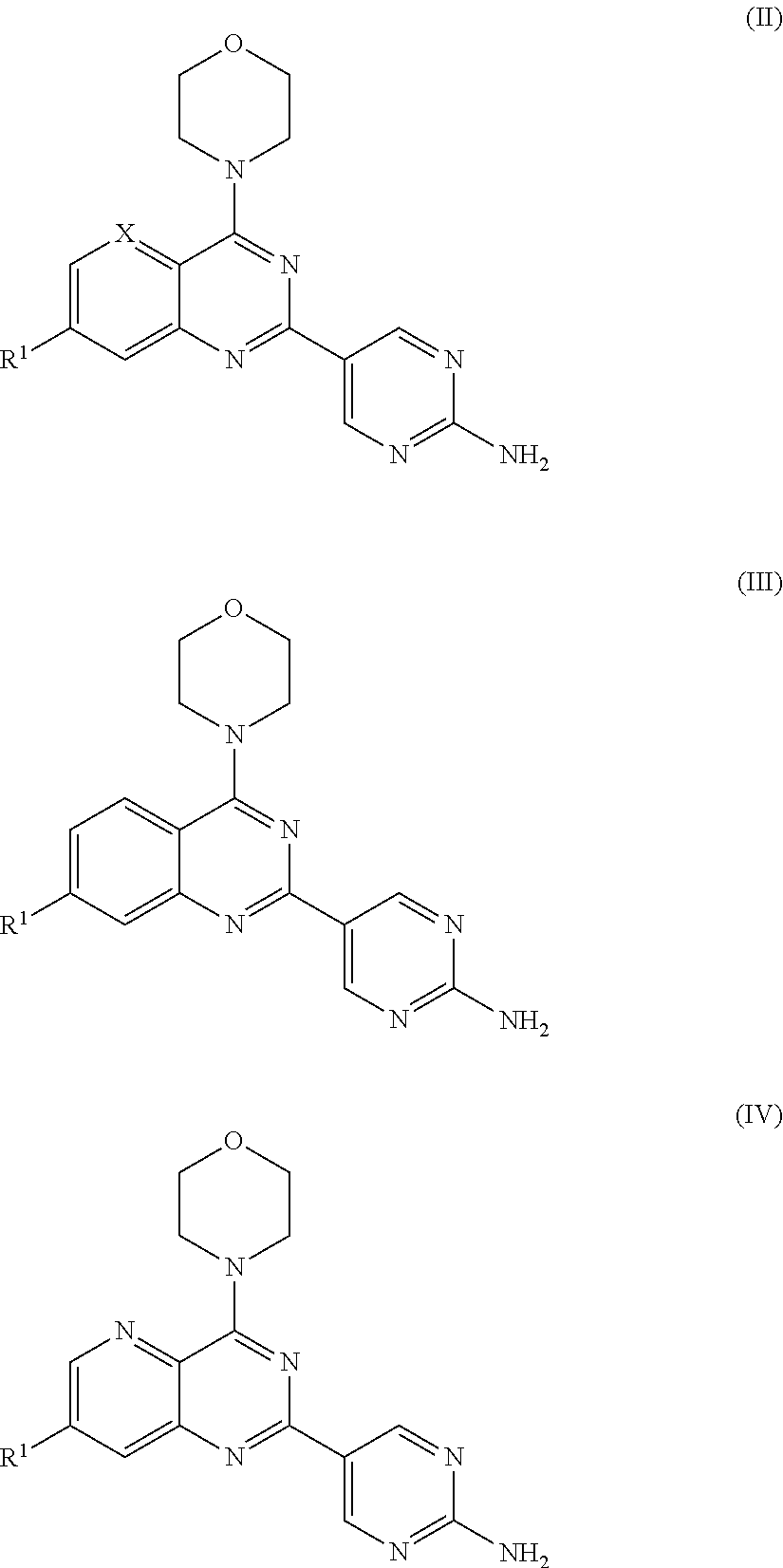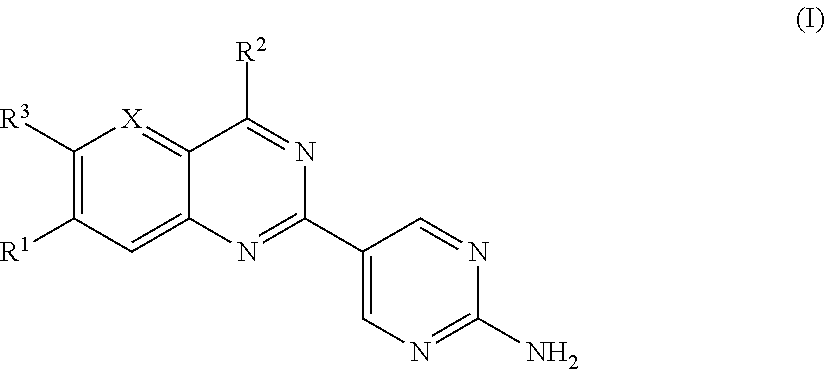Substituted amino-pyrimidine derivatives
a technology of aminopyrimidine and derivatives, which is applied in the field of substitution of aminopyrimidine derivatives, can solve the problems of drug-drug interaction, increased drug load, and increased drug load of single point in pi3k/akt/mtor signaling pathway,
- Summary
- Abstract
- Description
- Claims
- Application Information
AI Technical Summary
Benefits of technology
Problems solved by technology
Method used
Image
Examples
example 1
5-(7-(3-(Methylsulfonyl)phenyl)-4-morpholinoquinazolin-2-yl)pyrimidin-2-amine (Scheme I)
[0242]
Step 1: 4-(2-Chloro-7-(3-(methylsulfonyl)phenyl)quinazolin-4-yl)morpholine
[0243]
[0244]To a 50 mL round bottom flask, 4-(7-bromo-2-chloroquinazolin-4-yl)morpholine (0.25 g, 0.0007 mol—Preparation 1), 3-methylsulfonylphenylboronic acid (0.137 g, 0.0006 mol), sodium carbonate (0.121 g, 0.00105 mol), DMF (8 mL) and water (2 mL) were added. The reaction vessel was degassed with N2 for 5-10 minutes. To the same reaction mixture, Pd(PPh3)2Cl2 (0.027 g, 0.000035 mol) was added and the mixture again degassed with N2 for 5-10 minutes. The reaction mixture was stirred at 95° C. for 2 hours. The reaction mixture was cooled and water was added. The crude product was extracted with ethyl acetate. The organic layer was washed with water, brine and dried over sodium sulfate. The solvent was removed under the reduced pressure to afford the crude product. The crude product was purified by column chromatograp...
example 2
5-(6-Fluoro-7-(3-(methylsulfonyl)phenyl)-4-morpholinoquinazolin-2-yl)pyrimidin-2-amine (Scheme 1)
[0247]
Step 1: 4-(2-chloro-6-fluoro-7-(3-(methylsulfonyl)-phenyl)quinazolin-4-yl)-morpholine
[0248]
[0249]To a 50 mL round bottom flask, 4-(7-bromo-2-chloro-6-fluoroquinazolin-4-yl)morpholine (0.15 g, 0.0004 mol—Preparation 2), 3-methylsulfonylphenylboronic acid (0.078 g, 0.00039 mol), sodium carbonate (0.114 g, 0.0011 mol), DMF (6 mL) and water (2 mL) were added. The reaction vessel was degassed with N2 for 5-10 minutes. To the same reaction mixture, Pd(PPh3)2Cl2 (0.015 g, 0.000022 mol) was added and again degassed with N2 for 5-10 minutes. The reaction mixture was stirred at 90° C. for 3 hours. The reaction mixture was cooled and diluted with ethyl acetate. The organic layer was washed with water, brine and dried over sodium sulfate. The solvent was removed under the reduced pressure to afford the crude product. The crude product was purified by column chromatography (60-120 silica gel,...
example 3
N-(3-(2-(2-Aminopyrimidin-5-yl)-4-morpholinopyrido[3,2-d]pyrimidin-7-yl)-phenyl)acetamide (Scheme II)
[0253]
Step 1: N-(3-(2-Chloro-4-morpholinopyrido[3,2-d]pyrimidin-7-yl)phenyl)acetamide
[0254]
[0255]To a 100 mL round bottom flask, 4-(7-bromo-2-chloropyrido[3,2-d]pyrimidin-4-yl)morpholine (1.5 g, 0.0045 mol—Preparation 3), 3-acetamidophenylboronic acid (0.769 g, 0.0043 mol), sodium carbonate (1.2 g, 0.0113 mol), toluene (30 mL), ethanol (30 mL) and water (10 mL) were added. The reaction mixture was degassed with N2 for 5-10 minutes. To the same reaction mixture, Pd(PPh3)2Cl2 (0.159 g, 0.00022 mol) was added and again degassed with N2 for 5-10 minutes. The reaction mixture was stirred at 95° C. for 2 hours. The reaction mixture was cooled to room temperature and diluted with ethyl acetate. The organic layer was washed with water, brine, dried over anhydrous sodium sulfate and evaporated under reduced pressure to afford the crude product. The crude product was purified by column chromat...
PUM
| Property | Measurement | Unit |
|---|---|---|
| temperature | aaaaa | aaaaa |
| temperature | aaaaa | aaaaa |
| temperature | aaaaa | aaaaa |
Abstract
Description
Claims
Application Information
 Login to View More
Login to View More - R&D
- Intellectual Property
- Life Sciences
- Materials
- Tech Scout
- Unparalleled Data Quality
- Higher Quality Content
- 60% Fewer Hallucinations
Browse by: Latest US Patents, China's latest patents, Technical Efficacy Thesaurus, Application Domain, Technology Topic, Popular Technical Reports.
© 2025 PatSnap. All rights reserved.Legal|Privacy policy|Modern Slavery Act Transparency Statement|Sitemap|About US| Contact US: help@patsnap.com



